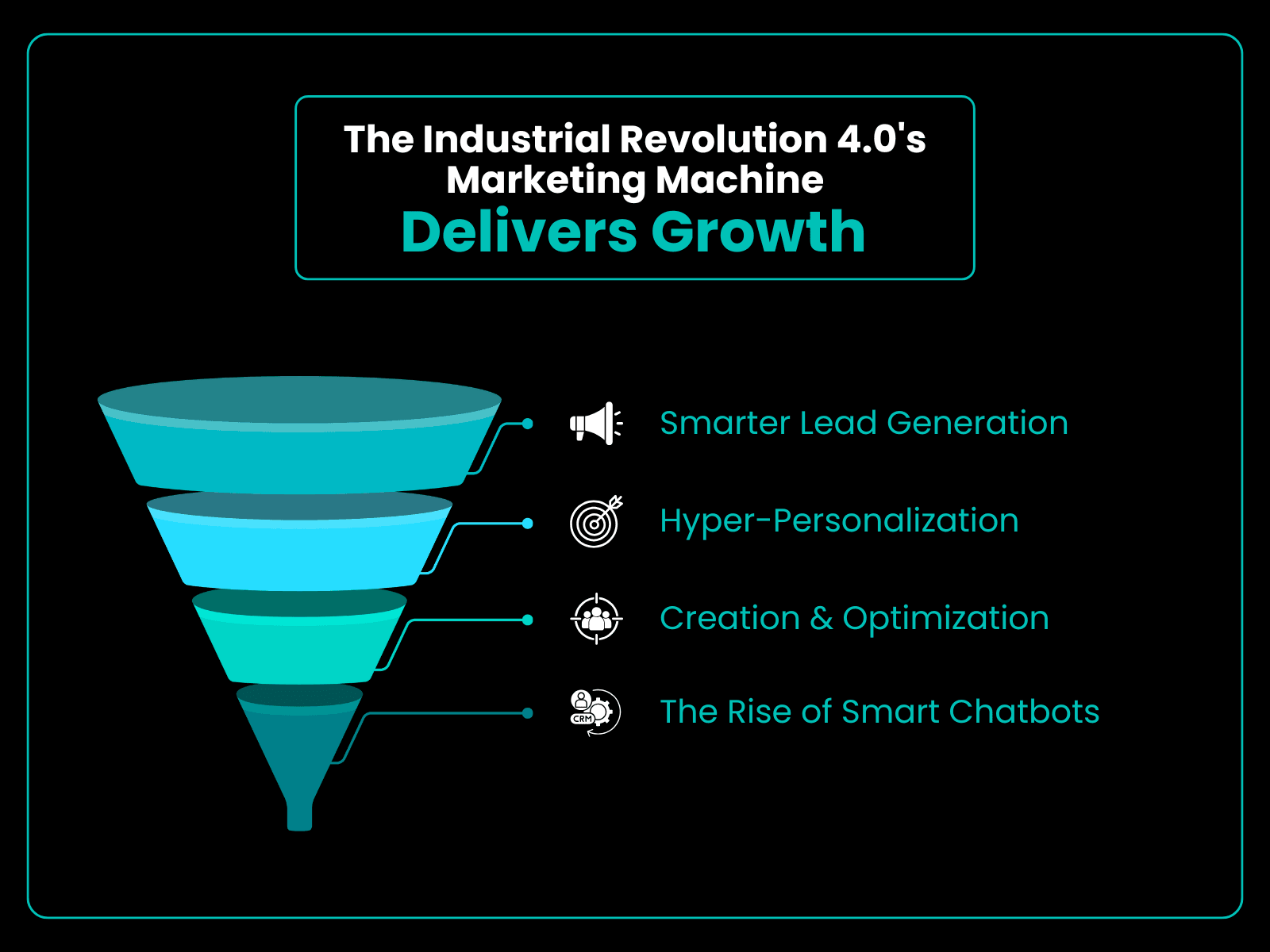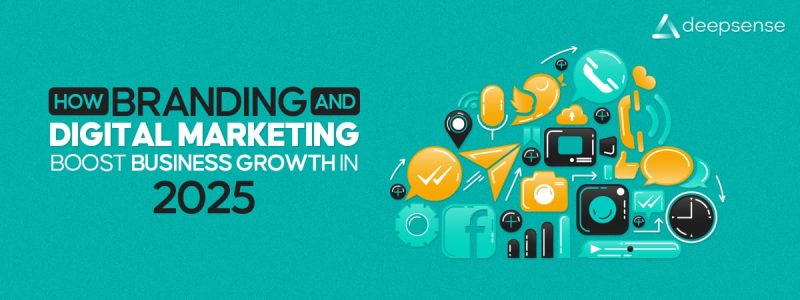From the gritty factory floor to sophisticated B2B sales funnels, a powerful transformation is underway. AI in industrial marketing is no longer a futuristic concept; it’s the cutting-edge technology that’s revitalizing how industrial and manufacturing companies connect with customers, optimize operations, and achieve unprecedented growth. Forget the notion that AI is exclusively for consumer brands – it’s here to reshape the very foundation of industrial commerce.
What Exactly Is AI Doing in Industrial Marketing?
Let’s be clear: we’re not talking about science fiction. AI in industrial marketing is about leveraging intelligent technologies like machine learning, natural language processing, and advanced analytics to make marketing smarter, faster, and more precise. Historically, industrial sales thrived on long-standing relationships and in-person interactions. But the landscape has shifted dramatically; a staggering 81% of B2B transactions now begin with an online search. This digital-first world demands a new approach, and AI is the definitive answer.
This intelligent technology empowers industrial companies to:
- Gain Deeper Insights: Understand complex customer behaviors and market trends by processing vast datasets faster than any human.
- Automate Tedious Tasks: Streamline repetitive marketing activities, freeing up your team for high-level strategy and relationship-building.
- Drive Strategic Decisions: Move from intuition to data-driven confidence, optimizing campaigns in real-time.
The Industrial Revolution 4.0’s Marketing Machine: How AI Delivers Growth

The integration of AI in industrial marketing is catalyzing growth across every facet of the digital journey.
Finding the Gold: Smarter Lead Generation
Traditional lead generation often feels like a guessing game. AI changes that entirely.
- No More Guessing Games: AI sifts through mountains of market and customer data, swiftly identifying actual potential buyers. Think about predictive analytics industrial marketing in action – these tools forecast future purchasing behaviors and pinpoint high-quality leads based on engagement levels, firmographics, and online behavior. This means your sales team focuses on prospects most likely to convert, boosting conversion rates by up to 25% and reducing cost per lead by around 15%.
- Automated, Yet Personal Outreach: AI crafts highly personalized emails and messages at scale. It can analyze a prospect’s past interactions, industry, and online behavior to create tailored communication, ensuring every outreach feels relevant and impactful, not robotic.
Talking Your Language: Hyper-Personalization
In the B2B industrial world, generic messages simply don’t cut it. Hyper-personalization in B2B driven by AI ensures every interaction is uniquely tailored.
- Tailored Experiences: Imagine websites, emails, and even product recommendations that adapt in real-time to a visitor’s industry, role, and past browsing history. A C-suite executive might see ROI projections, while an engineer gets detailed technical specifications.
- Beyond “Dear [First Name]”: AI understands the nuances of industrial buyer personas. It delivers content that resonates deeply, whether it’s a whitepaper on lean manufacturing for an operations manager or a case study showcasing complex machinery integration for a supply chain director. This level of customization dramatically improves engagement and conversion likelihood.
Content That Converts: Creation & Optimization
Content is king, and AI is your ultimate content co-pilot.
- AI as Your Content Co-Pilot: AI marketing tools for manufacturing can generate blog outlines, draft ad copy, and even produce initial product descriptions. This frees up human marketers to focus on strategic narratives, nuanced messaging, and refining content to perfection.
- SEO on Steroids: AI excels at search engine optimization (SEO). It identifies those niche, technical keywords industrial buyers are actively searching for, helping you optimize content to rank high. It can even perform content gap analysis, ensuring your offerings are seen by the right decision-makers.
Always-On Support: The Rise of Smart Chatbots
The industrial sales cycle can be long and complex, but AI-powered chatbots ensure no inquiry goes unanswered.
- 24/7 Answers: These intelligent assistants handle frequently asked questions, qualify leads by collecting basic project requirements (materials, quantities, timelines!), and efficiently route complex questions to the appropriate human expert. This means your potential buyers get instant support, and your sales team focuses on truly promising opportunities.
Boosting the Bottom Line: Efficiency & ROI
Ultimately, B2B digital marketing AI is about tangible results.
- Less Busywork, More Brainpower: By automating industrial sales tasks like data entry, scheduling, and follow-ups, AI allows your marketing and sales teams to dedicate their invaluable expertise to strategic thinking, relationship building, and closing high-value deals.
- Optimized Ad Spend: AI analyzes customer data to predict which ads will resonate most, ensuring your advertising budget is spent effectively. This precision targeting significantly improves your return on investment (ROI).
The “Human Factor” & The AI Rulebook: Ethical Debates and Best Practices
While AI offers immense power, its responsible implementation is paramount.
- The “Black Box” Problem: A legitimate concern is the opacity of some AI decision-making. Marketers must understand how AI reaches its conclusions to ensure ethical and effective strategies.
- Fair Play: Avoiding Bias: AI models learn from data. If that data contains biases, the AI can perpetuate them, leading to discriminatory marketing practices. Regular audits and diverse datasets are crucial to ensure fairness and inclusivity.
- Trust and Transparency: Companies must be transparent about their AI usage, clearly disclosing when AI is involved in content creation or customer interactions. Adhering to data privacy regulations like GDPR and CCPA is non-negotiable, building trust with your industrial clients. Ultimately, humans remain accountable for all AI outputs.
- AI as a Co-Worker, Not a Replacement: Experts agree: your job won’t be taken by AI; it will be taken by a person who knows how to use AI. This emphasizes the need for continuous learning and upskilling within your team, adapting to new tools and processes.
- Google’s E-E-A-T (Experience, Expertise, Authoritativeness, Trustworthiness): Even with AI’s ability to generate content, Google’s E-E-A-T framework remains critical. Content still needs human-verified experience, deep expertise, clear authoritativeness, and unwavering trustworthiness to rank well and be deemed credible. AI can assist in research and optimization, but human oversight is essential to inject authentic experience and strategic insights.
The Road Ahead: What’s Next for AI in Industrial Marketing?
The journey with AI in industrial marketing is just beginning. Expect rapid advancements:
- More Power, Deeper Personalization: Future AI will deliver even more granular customization and incredibly accurate predictive capabilities.
- Augmented Reality (AR) Experiences: Imagine potential customers visualizing complex industrial machinery directly within their own factory space using AR, powered by AI, before making a purchase decision.
- Agentic AI as Virtual Sales Assistants: Advanced AI systems are emerging that can autonomously manage lead nurturing end-to-end, qualify prospects, and even draft contracts for simpler deals, allowing human sales professionals to focus on strategic negotiations.
- The Continuous Evolution: AI marketing tools for manufacturing are constantly improving, becoming more accessible and cost-effective, consistently complementing and enhancing human expertise.
The Unbeatable Combo: Humans and AI Driving Industrial Success
The message is clear: AI in industrial marketing is a powerful catalyst for growth. However, it’s not a magic bullet that operates in isolation. The strategic vision, creative spark, and empathetic understanding of human marketers are irreplaceable. Industrial businesses that embrace AI smartly, ethically, and with robust human oversight will not only thrive but dominate the rapidly evolving digital landscape. It’s no longer a question of if you’ll integrate AI, but how intelligently you’ll do it.
FAQs:
1. What is AI in industrial digital marketing?
AI in industrial digital marketing refers to the use of artificial intelligence tools and algorithms to automate, optimize, and personalize marketing strategies for industrial businesses. It helps analyze large data sets, predict customer behavior, and improve decision-making to drive higher ROI.
2. How can AI improve lead generation for industrial companies?
AI enhances lead generation by identifying high-potential prospects through predictive analytics and data modeling. It can score leads automatically, track engagement patterns, and personalize outreach campaigns, making the sales process faster and more efficient.
3. Why is AI important for industrial growth?
AI streamlines operations, improves marketing efficiency, and provides data-driven insights that guide better decision-making. For industrial sectors, it also helps reduce downtime, predict maintenance needs, and align marketing strategies with production capabilities.
4. Can AI help in industrial SEO and content marketing?
Absolutely! AI tools can perform keyword research, optimize content for search intent, and even generate topic ideas tailored to target audiences. This leads to better search rankings, higher traffic, and stronger brand visibility in industrial niches.
5. What are some common AI tools used in industrial digital marketing?
Popular tools include ChatGPT for content creation, HubSpot and Salesforce Einstein for automation, SEMrush and Ahrefs for SEO optimization, and Google Analytics with AI features for performance insights.
6. How does AI personalize marketing campaigns for industrial audiences?
AI analyzes data from multiple touchpoints, like website visits, email interactions, and purchase history, to tailor messages for different audience segments. This ensures that each potential client receives relevant, customized content that resonates with their specific needs.
7. Is AI affordable for small and mid-sized industrial businesses?
Yes, many AI-based tools now offer scalable and cost-effective plans suitable for smaller companies. Businesses can start with affordable marketing automation, chatbot solutions, or AI-driven analytics, and expand as their operations grow.
8. How does AI improve customer engagement in the industrial sector?
AI-powered chatbots, predictive email marketing, and smart CRM systems help engage customers in real time, provide instant support, and deliver valuable insights, enhancing the overall customer experience.
9. Are there any risks or challenges in using AI for industrial marketing?
The main challenges include data privacy, high initial setup costs, and the need for proper training. However, with a well-planned implementation strategy, these risks can be managed effectively to ensure long-term success.
10. What’s the future of AI in industrial digital marketing?
The future looks promising, with advancements in predictive analytics, voice search optimization, and AI-driven marketing automation. Industrial businesses that adopt AI early will gain a significant competitive edge in efficiency, personalization, and customer satisfaction.











